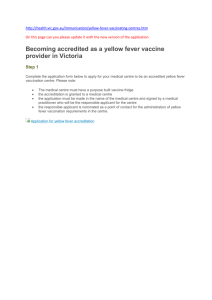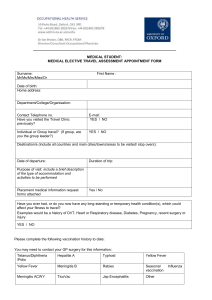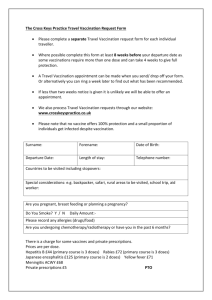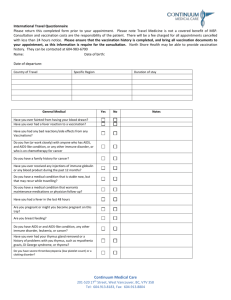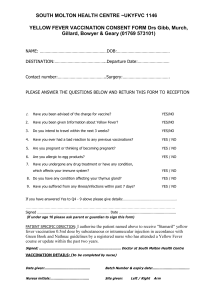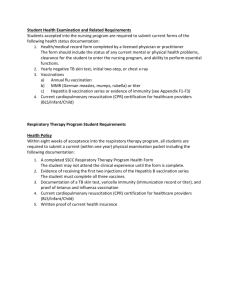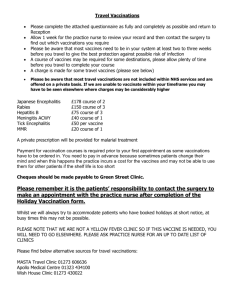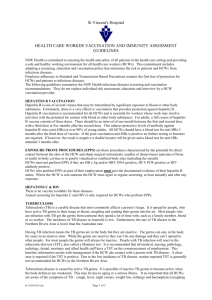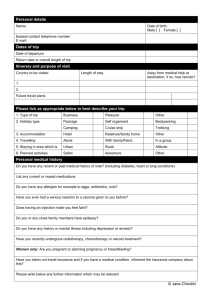IMMUNISATION INFORMATION FOR PATIENTS
advertisement
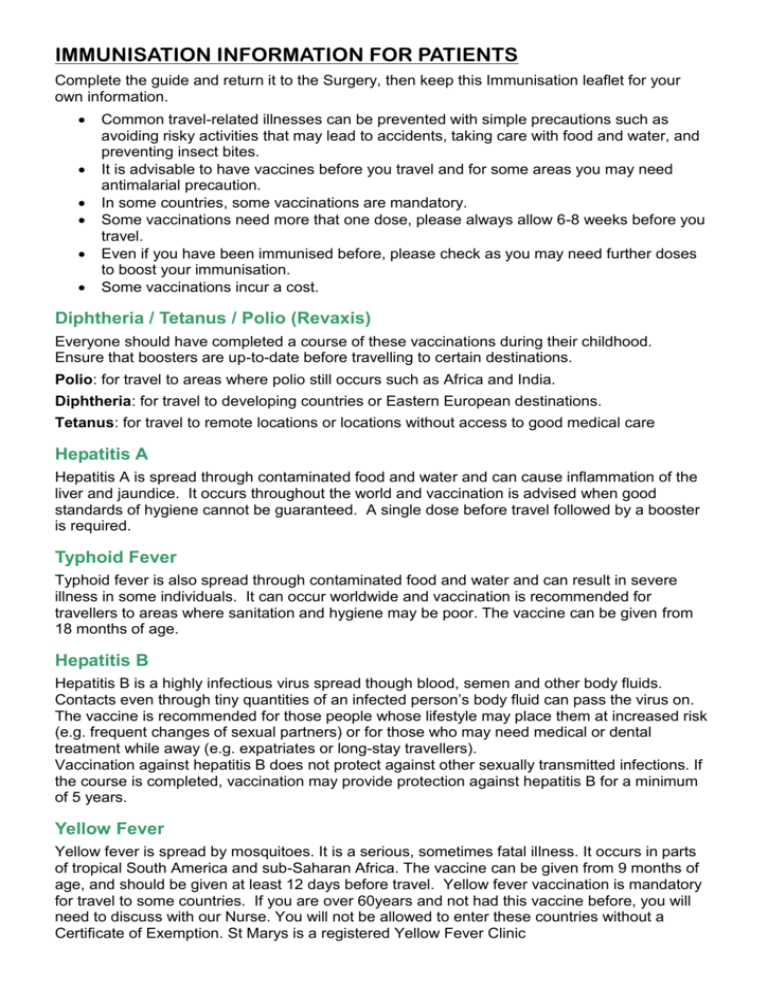
IMMUNISATION INFORMATION FOR PATIENTS Complete the guide and return it to the Surgery, then keep this Immunisation leaflet for your own information. Common travel-related illnesses can be prevented with simple precautions such as avoiding risky activities that may lead to accidents, taking care with food and water, and preventing insect bites. It is advisable to have vaccines before you travel and for some areas you may need antimalarial precaution. In some countries, some vaccinations are mandatory. Some vaccinations need more that one dose, please always allow 6-8 weeks before you travel. Even if you have been immunised before, please check as you may need further doses to boost your immunisation. Some vaccinations incur a cost. Diphtheria / Tetanus / Polio (Revaxis) Everyone should have completed a course of these vaccinations during their childhood. Ensure that boosters are up-to-date before travelling to certain destinations. Polio: for travel to areas where polio still occurs such as Africa and India. Diphtheria: for travel to developing countries or Eastern European destinations. Tetanus: for travel to remote locations or locations without access to good medical care Hepatitis A Hepatitis A is spread through contaminated food and water and can cause inflammation of the liver and jaundice. It occurs throughout the world and vaccination is advised when good standards of hygiene cannot be guaranteed. A single dose before travel followed by a booster is required. Typhoid Fever Typhoid fever is also spread through contaminated food and water and can result in severe illness in some individuals. It can occur worldwide and vaccination is recommended for travellers to areas where sanitation and hygiene may be poor. The vaccine can be given from 18 months of age. Hepatitis B Hepatitis B is a highly infectious virus spread though blood, semen and other body fluids. Contacts even through tiny quantities of an infected person’s body fluid can pass the virus on. The vaccine is recommended for those people whose lifestyle may place them at increased risk (e.g. frequent changes of sexual partners) or for those who may need medical or dental treatment while away (e.g. expatriates or long-stay travellers). Vaccination against hepatitis B does not protect against other sexually transmitted infections. If the course is completed, vaccination may provide protection against hepatitis B for a minimum of 5 years. Yellow Fever Yellow fever is spread by mosquitoes. It is a serious, sometimes fatal illness. It occurs in parts of tropical South America and sub-Saharan Africa. The vaccine can be given from 9 months of age, and should be given at least 12 days before travel. Yellow fever vaccination is mandatory for travel to some countries. If you are over 60years and not had this vaccine before, you will need to discuss with our Nurse. You will not be allowed to enter these countries without a Certificate of Exemption. St Marys is a registered Yellow Fever Clinic Meningococcal Meningitis Meningococcal meningitis is a bacterial infection that is spread by droplets from an infected person’s nose or throat. It occurs most frequently in sub-Saharan Africa and vaccination is particularly recommended for those who are going to live and work with local populations or who will be there for more than 4 weeks. Vaccination against the meningococcal strains, A, C, W135, and Y is mandatory for entry to Saudi Arabia in order to attend the Hajj or for the Umrah. Rabies Rabies is a fatal disease spread by the saliva of infected animals. It is present in many countries but is a higher risk in some developing countries. If you are travelling in rural areas of high-risk countries away from medical care, then you should consider vaccination before you go and avoid touching any local animals, even if they appear healthy. If you are bitten abroad you should seek medical attention immediately—even if you have been vaccinated. The course consists of 3 injections over 3-4 weeks. Malarial Prevention Malaria is a serious disease that is transmitted by mosquito bites. It can occur in many tropical destinations. There is no vaccination available, so prevention consists of a combination of preventive medication and avoidance of mosquito bites. Avoid being bitten by insects wherever possible: use insect repellents, wear light, loose clothing and sleep under a mosquito net if your accommodation is not air-conditioned. Seek advice on the most appropriate anti-malarial medication to suit your needs from your Nurse / GP. Please remember that anyone who has visited a malarious country should mention this to their GP if they develop a high fever up to 2 years after travelling. Japanese Encephalitis Japanese Encephalitis is a life-threatening viral disease which affects the brain. The virus is spread by mosquitoes in South East Asia and the Far East. The risk of infection is greatest during, or just after the wet season. The vaccine is recommended for travellers who will be staying for a month or longer, especially if travel will include rural areas. Vaccination can be given from one year of age and 2 or 3 doses are given over 2-4 weeks. If required please discuss with Nurse. This vaccine is only available through a travel clinic. Tick-Borne Encephalitis Tick-borne encephalitis is a viral infection spread by ticks and occurs in the summer months in forested areas of Central and Eastern Europe and Scandinavia. Vaccination is recommended for those who will spend prolonged periods in infected areas or those who will be camping or working in forests during the summer months. If required please discuss with Nurse. This vaccine is only available through a travel clinic. Recall times for maintaining protection Diptheria/ Tetanus/ Polio (travel) 5 does = lifetime immunity in UK & Europe Hepatitis A (travel) If 2nd booster within 1 year Yellow Fever Meningococcal meningitis ©12.07.2010 St Marys Surgery 10 years Typhoid 3 years 10years 25 years 10 years 3 years Hepatitis B 5 years Tick Borne Encephalitis Japanese Encephalitis Rabies 3 years 2-4 years 2-3 years
